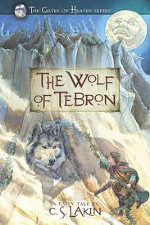
At the moment almost all entertainment forms seem determined to wrest control of faerie tales away from Disney and return them to their earlier, darker forms. With movies like Snow White and the Huntsman and TV shows like Once Upon a Time and Grimm, this shift is having a profound and in many ways welcome affect on the fantasy world. Retellings and new stories of faerie tales written more traditionally with less sparkles and more blood are immensely popular. While I have found many favorites among them, C.S. Lakin’s series the Gates of Heaven is in uncontested first place. As much as love this trend, a vital element of the older tales has been completely lacking in all the books I’ve read except those by Mrs. Lakin: hope.
The Wolf of Tebron is technically the first book of the series, but I’ve found that all the books stand alone with occasional nods to the other stories. This tale centers around the village blacksmith, Joran and his quest to find his missing wife. It is an epic quest. He must leave the quiet village and for the first time venture into the world beyond. But unlike most people who are just looking for a bigger city or a palace, he must find the house of the Moon, the cave of the South Wind, and the palace of the Sun. As he journeys, the line between his physical outward journey, and his inward one become magnificently blurry. (I’m still not completely certain which is which, and I’ve read it several times.) However, the moment of revelation comes when both the reader and Joram realize it doesn’t matter. Whatever real world forces are involved in his wife’s disappearance, much of the blame belongs to the darkness is Joram’s own heart.
With personification of elements like the Sun and the Wind, giant talking wolves, and a farm boy taking on the world, The Wolf of Tebron follows well in the steps of its forefathers. It knits truth and myth together, reaching deeper emotions and higher thoughts than either can on its own. Wonderful read alouds, the only element that makes these books inappropriate for younger readers is the language which leans wonderfully and consistently on the archaic side of things. If you’re familiar with George MacDonald, think a slightly more modern accent to his style of writing.
My thanks to Living Ink Books for providing me with a copy of The Wolf of Tebron via NetGalley in return for my honest opinion of the book.

